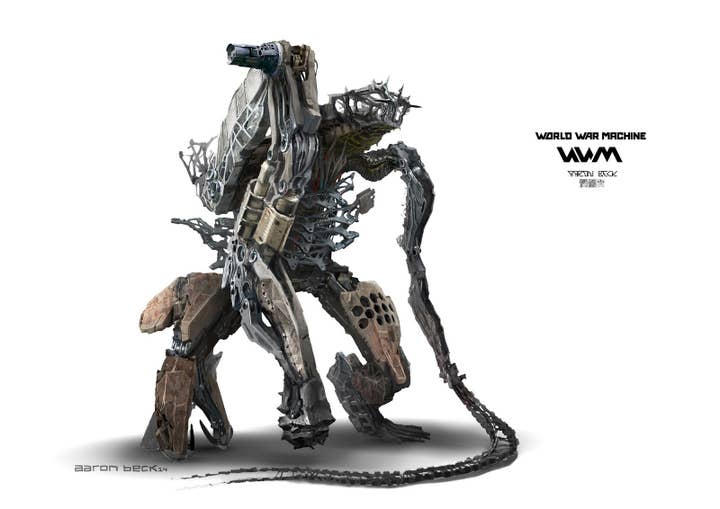Square Enix's Collective launches first crowdfunding campaign
Project lead Phil Elliott gives an update on the publisher's scheme for indies
Last week saw the first title from Square Enix's Collective, a hybrid of Kickstarter and Steam Greenlight, enter the crowdfunding stage of the process. It's the crucial moment for the new initiative, where we see if positive votes can translate into actual hard cash for the developer. And World War Machine from Tuque Games is an excellent test case, winning 90 per cent positive votes.
"The thing is it's an unusual project for a publisher so everyone is interested to see how it goes. Nobody, including me, knows exactly what to expect because it's utterly dependent on the content the developers bring and the opinions and support that the community brings," says project lead Phil Elliott.
"In terms of targets, the way this is set up is we're not funding games, we're not making the games, so it's right that the developers should be the beneficiary in terms of their success. We are trying to make sure that everything we do is adding value so that when we do ask for our cut it's at a point where there's nothing before the developer actually gets what they need."
"It's utterly dependent on the content the developers bring and the opinions and support that the community brings"
If you missed our feature on the launch of Collective in January the set up is fairly simple. It's free for developers to submit a game idea to the Collective platform where the community can vote on whether or not they want to see the game made. A game that succeeds there moves into a crowdfunding stage, where Square Enix gets five per cent of net crowdfunds raised. Once the game is in development, Square Enix could offer to distribute the game as well for a levy of 10 per cent net revenue.
"In the case of the crowdfunding split, the five per cent of net crowdfunds raised, we're only asking for that at the point where they have the money to then go on and finish the game," says Elliott. "That enables us to cover the cost to keep the feedback stage free for everybody."
"With the distribution side of things you're right, it could be another year before the first game launches fully and there that's 10 per cent net or it's about six per cent gross revenue which is a very very skinny cut even for a distribution, as opposed to a publishing, deal."
The pilot phase saw 100,000 visits across the four weeks, and almost a quarter of a million page views in total. That translated to 5000 votes cast in those four weeks across the three projects, with better results for some than others. Game Of Glens from Ruffian Games was one of the hot tips for the pilot phase but fell foul of fan expectations, receiving only 40 per cent yes votes. Elliott called it "plain bad luck" after fans mixed up a Microsoft teaser with news Ruffian were making a new game and expected a Crackdown title. Needless to say, they weren't best pleased to be wrong.

"I think Ruffian learned a lot, they learned what their community expects of them, and the people that follow them and know them well. I think they learned that it might be hard for them to do something like Game Of Glens and get that kind of gamer support right now as things are," explains Elliott.
"I know that they took a lot from it. It wasn't the best result, the best result would have been unbridled support and success, but at the same time for any team that comes to Collective to find out what may not be possible could save you a lot of time and money and heartache in the long run."
So far, so admirable, but this business isn't about altruism and Square Enix is a company currently going through a transition. Elliott is quick to dispel any suggestion that the Collective's sharing caring approach makes it a target the next time the company wants to make cuts.
"It's not something that is going to concern anyone if you're looking at the overall business cost"
"I would say that Collective is a low cost part of the business, because we're not funding games, we're not making games, we're leveraging the scale of of our publishing business to try and make that available to independent teams. A lot of that isn't costing us anything, using our social channels, sending out emails, all these things can be very effective in spreading the word but there's no real implied cost to that."
In the past Elliott has explained that any development support will come from existing Square Enix developers, "dozens of volunteers from our western studios," so any human resources costs are minimal for the studio.
"It's not something that is going to concern anyone if you're looking at the overall business cost. In terms of revenue the same would also be true, we could re-release a very popular game tomorrow or a Tomb Raider game or a Final Fantasy game and the revenue generated from that I'm sure would dwarf Collective's income probably for the next five years but again, it's a different type of project."
"I think there's definitely an appetite from all the way through the business, both in the West and in Tokyo, to see what Collective can become and there's a desire to really sort of see this through. I'm certainly not worried."

